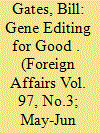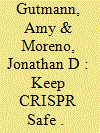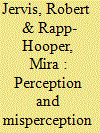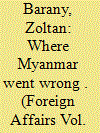|
|
|
Sort Order |
|
|
|
Items / Page
|
|
|
|
|
|
|
| Srl | Item |
| 1 |
ID:
158865


|
|
|
|
|
| Summary/Abstract |
Over the past decade, many marginally democratic countries have become increasingly author [2]itarian [2]. And authoritarian, xenophobic populist movements [3] have grown strong enough to threaten democracy’s long-term health in several rich, established democracies, including France, Germany, the Netherlands, Sweden, the United Kingdom, and the United States. How worried should we be about the outlook for democracy?
|
|
|
|
|
|
|
|
|
|
|
|
|
|
|
|
| 2 |
ID:
158867


|
|
|
|
|
| Summary/Abstract |
Sooner or later this economy will slow,” the New York Times columnist Thomas Friedman declared of China [1] in 1998. He continued: “That’s when China will need a government that is legitimate. . . . When China’s 900 million villagers get phones, and start calling each other, this will inevitably become a more open country.” At the time, just a few years after the fall of the Soviet Union, Friedman’s certainty was broadly shared. China’s economic ascent under authoritarian rule could not last; eventually, and inescapably, further economic development would bring about democratization.
|
|
|
|
|
|
|
|
|
|
|
|
|
|
|
|
| 3 |
ID:
158864


|
|
|
|
|
| Summary/Abstract |
As Americans struggle to make sense of a series of uncomfortable economic changes and disturbing [1]political developments [1], a worrying picture emerges: of ineffective politicians, frequent scandals, racial backsliding, polarized and irresponsible news media, populists spouting quack economic remedies, growing suspicion of elites and experts, frightening outbreaks of violence, major job losses, high-profile terrorist attacks, anti-immigrant agitation, declining social mobility, giant corporations dominating the economy, rising inequality, and the appearance of a new class of super-empowered billionaires in finance and technology-heavy industries.
|
|
|
|
|
|
|
|
|
|
|
|
|
|
|
|
| 4 |
ID:
158869


|
|
|
|
|
| Summary/Abstract |
Standing onstage in the auditorium of Beijing’s Great Hall of the People, against a backdrop of a stylized hammer and sickle, Xi Jinping sounded a triumphant note. It was October 2017, and the Chinese leader was addressing the 19th Party Congress [2], the latest of the gatherings of Chinese Communist Party elites held every five years. In his three-and-a-half-hour speech, Xi, who was appointed the CCP’s general secretary in 2012, declared his first term a “truly remarkable five years in the course of the development of the party and the country,” a time in which China had “stood up, grown rich, and become strong.” He acknowledged that the party and the country still confronted challenges, such as official corruption, inequality in living standards, and what he called “erroneous viewpoints.” But overall, he insisted, China was headed in the right direction—so much so, in fact, that he recommended that other countries draw on “Chinese wisdom” and follow “a Chinese approach to solving the problems facing mankind.” Not since Mao Zedong had a Chinese leader so directly suggested that others should emulate his country’s model.
|
|
|
|
|
|
|
|
|
|
|
|
|
|
|
|
| 5 |
ID:
158868


|
|
|
|
|
| Summary/Abstract |
In 1991, when the West was busy celebrating its victory in the Cold War and the apparent spread of liberal democracy to all corners of the world, the political scientist Samuel Huntington issued a warning against excessive optimism. In an article for the Journal of Democracy [2] titled “Democracy’s Third Wave,” Huntington pointed out that the two previous waves of democratization, from the 1820s to the 1920s and from 1945 to the 1960s, had been followed by “reverse waves,” in which “democratic systems were replaced . . . by historically new forms of authoritarian rule.” A third reverse wave was possible, he suggested, if new authoritarian great powers could demonstrate the continued viability of nondemocratic rule [3] or “if people around the world come to see the United States,” long a beacon of democracy, “as a fading power beset by political stagnation, economic inefficiency, and social chaos.”
|
|
|
|
|
|
|
|
|
|
|
|
|
|
|
|
| 6 |
ID:
158866


|
|
|
|
|
| Summary/Abstract |
At the height of World War II, Henry Luce, the founder of Time magazine, argued that the United States had amassed such wealth and power that the twentieth century would come to be known simply as “the American Century.” His prediction proved prescient: despite being challenged for supremacy by Nazi Germany and, later, the Soviet Union, the United States prevailed against its adversaries. By the turn of the millennium, its position as the most powerful and influential state in the world appeared unimpeachable. As a result, the twentieth century was marked by the dominance not just of a particular country but also of the political system it helped spread: liberal democracy.
|
|
|
|
|
|
|
|
|
|
|
|
|
|
|
|
| 7 |
ID:
158872


|
|
|
|
|
| Summary/Abstract |
It is not often that a Ritz-Carlton becomes a detention facility. But last November, when a large slice of the Saudi elite was arrested on accusations of corruption [1], the luxury hotel in Riyadh became a gilded prison for hundreds of princes, billionaires, and high-ranking government officials. Behind this crackdown was the young crown prince, Mohammed bin Salman, also known as MBS [2], who is attempting to remake the kingdom’s economy and social life, and even the House of Saud itself.
|
|
|
|
|
|
|
|
|
|
|
|
|
|
|
|
| 8 |
ID:
158876


|
|
|
|
|
| Summary/Abstract |
Today, more people are living healthy, productive lives than ever before. This good news may come as a surprise, but there is plenty of evidence for it. Since the early 1990s, global child mortality has been cut in half [1]. There have been massive reductions in cases of tuberculosis, malaria, and HIV/AIDS [2]. The incidence of polio has decreased by 99 percent, bringing the world to the verge of eradicating a major infectious disease, a feat humanity has accomplished only once before, with smallpox. The proportion of the world’s population in extreme poverty, defined by the World Bank as living on less than $1.90 per day, has fallen from 35 percent to about 11 percent.
|
|
|
|
|
|
|
|
|
|
|
|
|
|
|
|
| 9 |
ID:
158874


|
|
|
|
|
| Summary/Abstract |
By many standard measures, globalization is in retreat [1]. The 2008 financial crisis and the ensuing recession brought an end to three decades of rapid growth in the trade of goods and services. Cross-border financial flows have fallen by two-thirds. In many countries that have traditionally championed globalization, including the United States and the United Kingdom, the political conversation about trade has shifted from a focus on economic benefits to concerns about job loss, dislocation, deindustrialization, and inequality [2]. A once solid consensus that trade is a win-win proposition has given way to zero-sum thinking and calls for higher barriers. Since November 2008, according to the research group Global Trade Alert, the G-20 countries have implemented more than 6,600 protectionist measures.
|
|
|
|
|
|
|
|
|
|
|
|
|
|
|
|
| 10 |
ID:
158878


|
|
|
|
|
| Summary/Abstract |
The possibility of rewriting the genome of an organism, or even of an entire species, has long been the stuff of science fiction. But with the development of CRISPR [1] (which stands for “clustered regularly interspaced short palindromic repeats”), a method for editing DNA [2] far more precisely and efficiently than was possible with older technologies, fiction has edged closer to reality. CRISPR exploits an ancient system that allows bacteria to acquire immunity from viruses. It uses an enzyme called Cas9 to cut strands of DNA at precisely targeted locations, allowing researchers to insert new genetic material into the gap.
|
|
|
|
|
|
|
|
|
|
|
|
|
|
|
|
| 11 |
ID:
158877


|
|
|
|
|
| Summary/Abstract |
Military and political leaders have worried about large-scale biological warfare [1] for more than a century [2]. “Blight to destroy crops, Anthrax to slay horses and cattle, Plague to poison not armies only but whole districts—such are the lines along which military science is remorselessly advancing,” Winston Churchill lamented in 1925. But despite the deadly potential of biological weapons, their actual use remains rare and (mostly) small scale. Over the last several decades, most states have given up their programs. Today, no country is openly pursuing biological weapons.
|
|
|
|
|
|
|
|
|
|
|
|
|
|
|
|
| 12 |
ID:
158873


|
|
|
|
|
| Summary/Abstract |
In 2016, nearly 50,000 people died [1] of opioid overdoses in the United States, and, per capita, almost as many died in Canada. From 2000 to 2016, more Americans died of overdoses than died in World War I and World War II combined. Yet even these grim numbers understate the impact of opioid abuse, because for every person who dies, many more live with addiction. The White House Council of Economic Advisers has estimated [2] that the epidemic cost the U.S. economy $504 billion in 2015, or 2.8 percent of GDP.
|
|
|
|
|
|
|
|
|
|
|
|
|
|
|
|
| 13 |
ID:
158871


|
|
|
|
|
| Summary/Abstract |
North Korea has all but completed its quest for nuclear weapons. It has demonstrated its ability to produce boosted-fission bombs and may be able to make fusion ones, as well. It can likely miniaturize them to fit atop a missile. And it will soon be able to deliver this payload to the continental United States. North Korea’s leader, Kim Jong Un, has declared his country’s nuclear deterrent [1] complete and, despite his willingness to meet with U.S. President Donald Trump, is unlikely to give it up. Yet Washington continues to demand that Pyongyang relinquish the nuclear weapons it already has, and the Trump administration has pledged that the North Korean regime will never acquire a nuclear missile that can hit the United States. The result is a new, more dangerous phase in the U.S.–North Korean relationship: a high-stakes nuclear standoff.
|
|
|
|
|
|
|
|
|
|
|
|
|
|
|
|
| 14 |
ID:
158870


|
|
|
|
|
| Summary/Abstract |
When it comes to North Korea [1], U.S. President Donald Trump’s policies have been whiplash inducing. On February 23, he appeared to be gearing up for a conflict when he said that if sanctions against Pyongyang didn’t work, Washington would have to move to “phase two,” which could be “very, very unfortunate for the world.” But just two weeks later, Trump abruptly changed course and accepted an invitation to meet with North Korean leader Kim Jong Un—a decision that caught even his own White House and State Department by surprise.
|
|
|
|
|
|
|
|
|
|
|
|
|
|
|
|
| 15 |
ID:
158875


|
|
|
|
|
| Summary/Abstract |
Late last year, when news broke that Myanmar’s military had been systematically killing members of the country’s Muslim Rohingya minority [1], much of the world was shocked. In recent years, Myanmar (also known as Burma) had been mostly a good news story. After decades of brutal dominance by the military, the country had seen the main opposition party, the National League for Democracy, score an all-too-rare democratic triumph [2], winning the 2015 national elections in a landslide. The NLD’s leader, Aung San Suu Kyi, an internationally celebrated dissident who had received the 1991 Nobel Peace Prize for her efforts to democratize Myanmar, became Myanmar’s de facto head of state. Many analysts and officials concluded that the county was finally on the path to democratic rule. Support poured in from Western democracies, including the United States. Myanmar had long been isolated, relying almost exclusively on China, which was content to turn a blind eye to human rights abuses. Now, many hoped, Suu Kyi [3] would lead the country into the Western-backed international order.
|
|
|
|
|
|
|
|
|
|
|
|
|
|
|
|
|
|
|
|
|